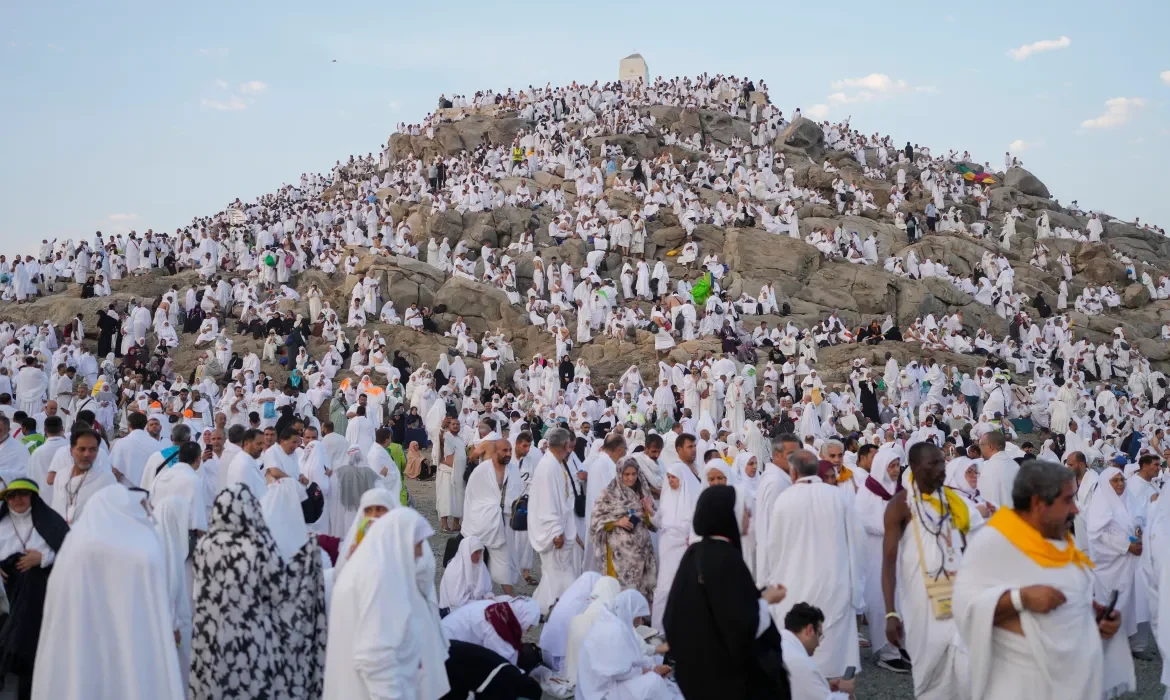As the 2025 Hajj season gathers momentum, with thousands of Nigerian pilgrims either finalising travel plans or already en route to the Kingdom of Saudi Arabia, a disturbing trend continues to surface beneath the white garments of ihram and the outwardly sacred journey to the Holy Land. The Hajj, widely regarded as the fifth pillar of Islam and a spiritual climax for devout Muslims, is increasingly being exploited by individuals whose lives and actions stand in stark contradiction to the principles it represents.
The Saudi authorities, in collaboration with Nigerian security agencies, have recently intercepted several notorious individuals attempting to exploit the pilgrimage as a cover. Among them was Yahaya Zango, a known bandit linked to multiple kidnapping operations across Northern Nigeria, who was apprehended at the Hajj camp in Abuja during pre-departure screening. Similarly, Sani Galadi, believed to be involved in abductions across Kogi and the Federal Capital Territory, was arrested at the Sultan Abubakar III International Airport in Sokoto while posing as a prospective pilgrim. These arrests have reignited national debate over the desecration of Hajj by individuals with criminal backgrounds.
The painful irony is that Hajj, a journey meant to symbolise spiritual rebirth and repentance, is increasingly being manipulated by individuals who have neither repented nor embraced the foundational knowledge and responsibilities of Islam. For many Nigerian Muslims, particularly those of influence and means, the Hajj has become less a spiritual obligation and more a performative ritual, an annual migration to Mecca that neither reflects deep introspection nor triggers meaningful moral transformation.
The Islamic faith is anchored on five core pillars: Shahadah (the testimony of faith), Salah (daily prayers), Zakah (obligatory charity), Sawm (fasting during Ramadan), and Hajj (pilgrimage to Mecca for those physically and financially able). These pillars, in order, reflect a divine structure: the internalisation of faith first, followed by regular devotion, social responsibility, spiritual discipline, and finally, the crowning act of Hajj, which is only meaningful when built on the foundations of the preceding obligations.
The Qur’an is unambiguous in its command: “Pilgrimage to this House is an obligation by Allah upon whoever is able among the people. But whoever disbelieves – then indeed, Allah is free from need of the worlds” (Surah Al-Imran 3:97). Similarly, in Surah Al-Baqarah 2:197, Allah instructs: “And take provisions, but indeed, the best provision is Taqwa (God-consciousness). So fear Me, O you of understanding.” These divine instructions underscore the spiritual prerequisites for Hajj, purity of intention, knowledge, and sincere repentance.
The Prophet Muhammad (peace be upon him) further reinforced this by stating, “Allah is Pure and only accepts what is pure” (Sahih Muslim). The implication is clear: money stolen from the public purse, bribes collected in secrecy, and dishonest gains cannot be transformed into spiritual offerings by merely dressing in white and circumambulating the Kaaba.
But what we are seeing today is a worrying spiritual dissonance. Politicians who have looted state treasuries and imposed policies that deepen poverty find themselves honoured as Alhajis and Alhajas after Hajj. Businesspeople who exploit the masses with substandard goods and cutthroat prices claim religious cleansing in Mecca. Civil servants who sabotage public service through absenteeism, bribery, and collusion now see the pilgrimage as a spiritual sanitiser.
Shockingly, even those in the health sector, doctors, nurses, and pharmacists who divert public drugs for private gain or direct patients from public hospitals to their own clinics, are seen among the Hajj-bound, clad in sacred garments. Teachers, school administrators, and exam officials who commercialise education through malpractice and ‘miracle centres’ also join the sacred journey, despite their betrayal of a generation.
Contractors who win public bids but deliver death traps in the form of collapsed buildings and failed roads continue to secure seats on Hajj flights. Their actions cost lives and billions in taxpayer money, yet they seek absolution through rituals rather than restitution.
Even more troubling is the emergence of drug traffickers and human traffickers who now exploit the religious cover of Hajj. These criminals, who destroy lives and tear families apart, now mask their identities with white garments, parading among genuine worshippers in Mecca as if the journey itself can undo the depth of their crimes.
This is not an indictment of Hajj, far from it. The pilgrimage remains a noble and vital act of worship, sanctioned by Allah and honoured by sincere believers across generations. Rather, this is a wake-up call to Nigerian Muslims: Hajj is not a cosmetic spiritual exercise. It is not a status symbol. It is a solemn act of devotion meant to reflect a life of faith, repentance, and moral discipline.
Islam is not confined to the rituals of pilgrimage. It is a comprehensive way of life, a faith that demands truthfulness in business, justice in leadership, compassion in healthcare, integrity in education, and humility in personal dealings. The essence of Tawheed, the Oneness of Allah, should shape our actions every day, not just during the Hajj season.
Until Nigerian Muslims prioritise genuine submission over symbolic acts, until we stop attempting to “stone the devil” in Saudi Arabia while comfortably “dining with him” back home, the sanctity of Hajj will continue to be undermined by the hypocrisy of those who wear its garments without embodying its spirit.
Let the pilgrimage return to what it truly is, a declaration of faith, a rebirth of character, and a journey back to righteousness. Without that, our flights to Makkah will remain nothing more than expensive charades.
